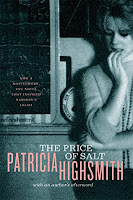I’ve seen Patricia Highsmith’s 1952 classic The Price of Salt recommended a bunch of times as an example of early lesbian literature in the U.S. and one of the first with an ending that doesn’t leave at least one of the women dead or gone back to a man. Does this mean a HEA?
Not exactly.
The protagonist is Therese Belivet, a twenty-one-year-old woman just beginning in her career as a stage designer. She’s dating Richard, a wannabe painter, and she’s working part-time, through Christmas, at a department store in N.Y.C.. For backstory, she grew up in an orphanage after her father’s death and mother’s abandonment. So she has some baggage. However, her inability to love Richard and her distaste for sex with him is not the result of childhood trauma.
One day, a woman comes into the store looking for a doll for her daughter and Therese’s heart stops. It’s love at first sight. The woman, Carol Aird, leaves her address to have the doll shipped, and Therese boldly sends her a Christmas card. Carol responds with a lunch invitation.
Therese soon learns that Carol is in the process of divorcing her husband. The husband is trying to wrangle additional custody of their daughter, Rindy. This all makes Carol a bit moody and sometimes mean. In a way, Carol is trying to protect Therese. She knows better the consequences of two women falling in love.
Therese is too smitten to be put off by Carol’s shifting moods and they begin spending more time together. This culminates in a cross-country road trip. While on the road, their relationship develops further, both emotionally and sexually. So far so good.
However, they learn that Carol’s husband is having them followed by a detective, who now has evidence of their love affair. Seeing as this is the 1940s or 50s, running off with another woman is far more detrimental to Carol’s reputation than running off with a man. Her husband threatens to use the information to gain total custody of Rindy. And unless Carol gives up Therese altogether, he will not allow her to see her child again.
The novel has a very brooding atmosphere despite moments of joy. Conversations are often stilted. Interactions with other characters are often referred to after the fact, which keeps the focus on the pair but also adds to a sense of claustrophobia.
It’s easy to see why this novel is a classic. Still, I found the happy ending rather sad.














No comments:
Post a Comment